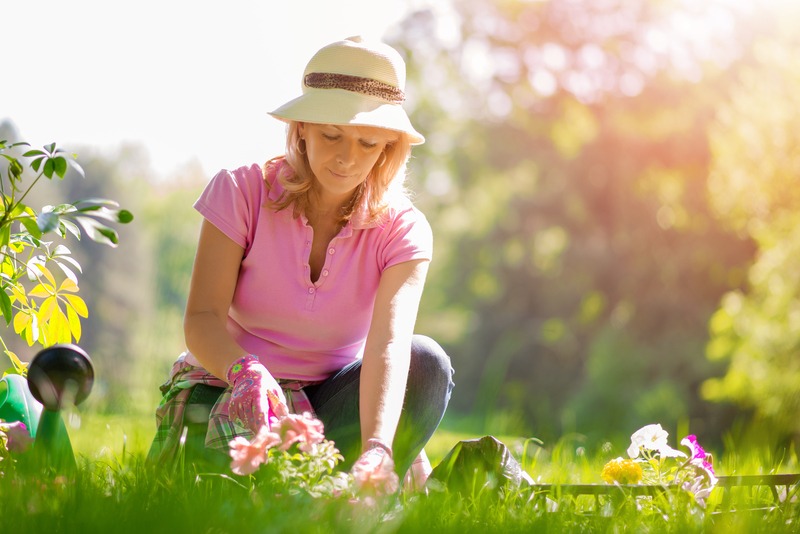If you are looking into gardening as a hobby, you’re not alone. Many Americans have discovered this beautiful and rewarding pastime. Gardening brings you closer to nature, and can actually lower your blood pressure as you work in the cool soil. But if this isn’t something you’ve tried before, it’s important to think ahead about what kind of gardening you’re interested in learning! There are a myriad of plants in the world, and being able to learn all of them at once is not your goal! What do you need to begin to get serious about gardening?
Create a Plan
You know what sort of space you have available for gardening. Some have acreage and want to portion out parts of it for different types of gardens. Some prefer to garden closer, in flower beds along their homes. Others have small areas in front of an apartment or mobile home, tiny home, or town house, which might be perfect for container gardening. You can look at your space and determine your needs before you begin! There are nearly as many different gardening styles as there are individuals who garden! Finding your own style and needs is important.
Determine Your Gardening Ethos
Nobody wants to dislike their hobby by trying to do it “perfectly” or too quickly! Some individuals want to spend hours and dedicate massive spaces to their new hobby, but then they get exhausted by building up too quickly. Some gardens are best if they can see their plants daily, in the front yard instead of the back. Some do best with containers on their deck or patio, or herb gardens in the house to begin. Whatever your capacity is, remember that just like something like bodybuilding, you can’t do anything in one day! It would be silly to lift weights for once and think you should be an expert. Gardening requires that you allow yourself to learn as you grow.
Clear Yard Space
You’ll need space for your garden, so the first physical work comes after you determine how much of your space needs to be dedicated to gardening. Beyond that, you need to know what you want to plant, the method of tending that helps the plant grow, what kind of soil to use, and whatever other factors are necessary in your area. You need to know if food plants are allowed to be grown in your front yard or only in the back, and if your HOA has any specific requirements for gardening plots.
Find Storage Space for Equipment
With all the gardening supplies to grab, where do you put them? A modular garage can give you more freedom to do more with the space on your property, including gardening. If having a shed or small modular garage is a possibility, it’s a great place where you can store your new hobby’s tools instead of muddying up the household. This can be as little as rakes, and shovels for a small garden plot. But, if you are gardening a lot, extra bags of soil, fertilizer, seeds, and weed killer can all be put in here as well.
Learn From the Experts
Now that you know what kind of things you want to plant and have a little bit of a plan for your garden, it’s a great choice to take a class! Why? Local extension offices and even gardening online websites have free classes available to take. If you want a succulent garden, each plant needs very different watering, draining, and love than a garden plot of corn or tomatoes. Some plants love to grow next to each other, or below one another, and some do not. Some are too close genetically, and, like cucumbers and cantaloupe, will happily make hybrid cuca-loupes which sound interesting, but don’t taste delicious. Learning from an expert who can guide you Is a great option.
Start Slowly
The experts will tell you: it’s a great idea to start slowly, and with plants which are responsive and simpler to care for. Build slowly and continue that growth as you succeed in simple plants. Having, for example, grown tomatoes and cucumbers one year, can be built upon the next by adding squash and zucchini. There are great winter plants if you want to keep going “out of season.” Remember, your gardening needn’t be perfect to be fun.
Adapt Your Style
No matter what you are learning to do, as you develop a new hobby, there will be some things you want to do which you find out are not your favorites. If you feel like you “should” be growing roses, but you prefer hydrangeas, remember that it’s ok to not grow roses! Get rid of those “should-y” feelings and determine what’s best for your individual life. Your capacity for gardening might change from year to year, as well. Find the things which spark joy in your mind and heart, and the plants which you enjoy watching grow!
Enjoy Your Labors
Like with most hobbies, there’s always a skill to learn and strengthen within gardening! It’s important to remember to enjoy the beauty of what you’ve created. Nurturing the Earth nurtures you as well. Having flowers around you, and fruit and vegetables that you’ve helped grow, and now can enjoy matters! Make sure to take the time to sit back and relax and enjoy the literal fruits of your labors. Fresh tomatoes grown in your own sunshine taste heavenly!
Your ideal garden is coming, but it might be a few years of building to get there. That’s a good thing! It means you’ve found a hobby which has the potential for learning and continual growth, with both plants which sprout happily and grow easily, and others which you nurture and protect carefully to get the rewards of your labors. Pretty soon you’ll be looking forward to the turn of the seasons, the tilling of the soil, and the ongoing turnover of greenery in your yard. The Earth, and your health, will thank you!
Read this next: Making Your Own Hummus: What To Know



